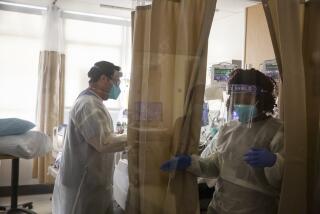The Exhausted World of Doctors in Training
- Share via
Re “Some Rest for Medical Residents,” June 30: When I was an ob-gyn resident at County-USC 30 years ago, a lot of the same issues were raised regarding work hours. It always seemed to me that there was a lot of self-selection at work. Those with the easiest hours (for example, dermatology, psychiatry) complained the most and were the most politically active. Those with the harder hours (for example, general surgery, orthopedics, ob-gyn) complained the least. Neurosurgery was always beyond the pale.
My week was generally 80-plus hours, and there were many times that I was dead tired. But I was 20-something and had youth on my side and, hey, medical training was only a few years out of my life, right? Besides, we had supervision and learned that decisions that simply yielded to fatigue were wrong. To believe otherwise was delusional, dishonest and/or dangerous. It was only after I finished residency and was in practice that I discovered that there would still be times that I was dead tired, except now I was older and on my own. Fortunately, I had learned early on how to deal with fatigue, how to think clearly or do surgery at 4 a.m. when I really wanted to be home in bed.
My point is this: Being a physician takes dedication and professionalism. You have to acquire these virtues sometime. Better that you learn them while in training when there are others to support you than to try to learn them remedially when you are in practice alone at night and really tired for the first time.
Richard Zalar MD
Fallbrook
*
Exhausted people don’t make good physicians. Instead, they make mistakes and begin to resent the very patients for whom they’re charged to care. That model produces poor results now or in the future. It’s always been a simple issue of money. Publicly funded hospitals with tight budgets look for cheap, highly motivated labor to “service” as many patients as possible. Who’s better than a resident physician? They’ll do anything they’re told for fear of being tossed out of their programs or being considered wimps by fellow trainees -- even at the expense of quality care.
The new law doesn’t go far enough. No one should be forced to work longer than 12 hours straight, or more than 60 hours in a week. Do you, as a sick patient, want a sleep-deprived person making critical decisions for your health and safety?
Daniel Levy MD
Santa Barbara






